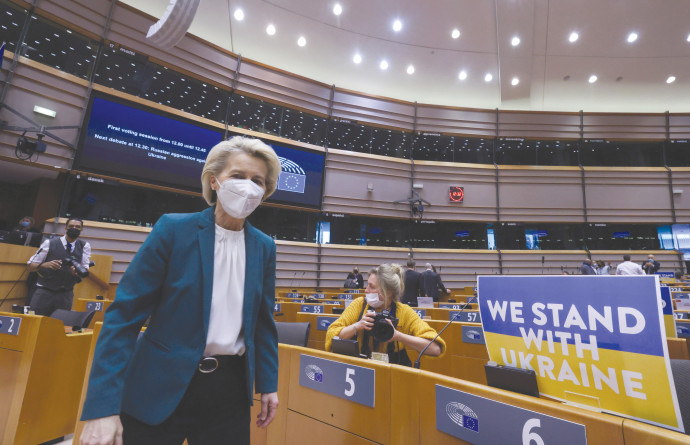President Joe Biden on Friday took new steps along with US allies to punish Russia economically over its invasion of Ukraine, targeting trade and shutting down development funds while also announcing a ban on imports of Russian seafood, vodka and diamonds.
Biden said the economic moves collectively will deliver "another crushing blow" to Russia's economy, already weighed down by global sanctions that have cratered the rouble and forced the stock market to close. Biden again put the blame on Russian President Vladimir Putin.
"Putin is an aggressor. Putin is the aggressor. And Putin must pay a price," Biden said at the White House, noting he had earlier spoke by phone to Ukraine President Volodymyr Zelensky.
European Union announces additional sanctions
The European Union will suspend Moscow's privileged trade and economic treatment, crack down on its use of crypto-assets and ban exports to Russia of EU luxury goods and import of iron and steel goods, the head of the European Commission said on Friday.
The new measures amount to a fourth set of sanctions against Russia over its invasion of Ukraine, coordinated with the United States and other G7 allies.
"Tomorrow, we will take a fourth package of measures to further isolate Russia and drain the resources it uses to finance this barbaric war," Ursula von der Leyen said.
Along with other western allies, such as the United States, the bloc will revoke Russia's "most-favored nation" trade status. This would open the door to the bloc banning or imposing punitive tariffs on Russian goods and putting Russia on a par with North Korea or Iran.
As a first step, the EU will prohibit imports of iron and steel sector goods.

Von der Leyen said in a statement that Russia's membership rights of leading multilateral institutions, such as the International Monetary Fund and the World Bank, would be suspended.
"Russia cannot grossly violate international law and at the same time expect to benefit from the privileges of being part of the international economic order," von der Leyen said.
G7 allies will seek next week to coordinate targeting of Putin's "cronies" and will strive to ensure Russia and its elites cannot use crypto-assets to circumvent sanctions.
The European Union specifically will ban exports to Russia of EU luxury goods, designed as a blow to Russia's elites.
Finally, the bloc will ban new European investments in Russia's energy sector.
"This ban will cover all investments, technology transfers, financial services, etc. for energy exploration and production – and thus have a big impact on Putin," von der Leyen said.
EU goods imports from Russia totaled 145 billion euros ($158.7 billion) in 2019, according to EU statistics office Eurostat, of which 101 billion euros was for oil and gas.
The US is planning to ban imports of Russian alcohol and seafood, according to people familiar with the matter, in the latest effort to punish Moscow for the country’s invasion of Ukraine.
President Biden is expected to detail the ban during a speech Friday morning in which he will call for revoking normal trade relations with Russia.
The White House declined to comment.
Russia opened a criminal case against Facebook's parent Meta Platforms on Friday and moved to designate it as an "extremist organization" after the social network changed its hate speech rules to allow users to call for violence against Russians in the context of the conflict in Ukraine.
"A criminal case has been initiated ... in connection with illegal calls for murder and violence against citizens of the Russian Federation by employees of the American company Meta, which owns the social networks Facebook and Instagram," Russia's Investigative Committee said.
The committee reports directly to President Vladimir Putin. It was not immediately clear what the consequences of the criminal case might be.
No comment was immediately available from Meta in response to a Reuters request.
Two weeks into Russia's war in Ukraine, a Meta spokesperson said on Thursday the company had temporarily eased its rules for political speech, allowing posts such as "death to the Russian invaders," although it would not allow calls for violence against Russian civilians.
Meta said the temporary change aimed to allow for forms of political expression that would normally violate its rules. Its oversight board said on Friday that it was closely following the war in Ukraine, and how Meta is responding.
The Russian state prosecutor's office said: "Such actions of the company's management not only form an idea that terrorist activity is permissible, but are aimed at inciting hatred and enmity towards the citizens of the Russian Federation."
The prosecutor's office said it had applied to a court to recognize Meta as an extremist organization and prohibit its activities in Russia.
Internal Meta emails seen by Reuters showed the US company had temporarily allowed posts that call for the death of Putin or Belarusian President Alexander Lukashenko.
"We hope it is not true because if it is true then it will mean that there will have to be the most decisive measures to end the activities of this company," Kremlin spokesman Dmitry Peskov said.
The United Nations human rights office said the potential change in Facebook policy was "concerning."
